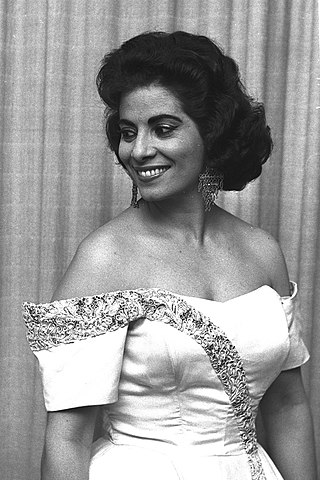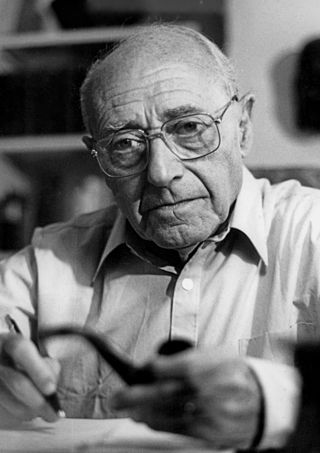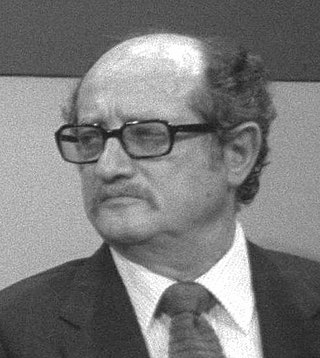
Daniel Barenboim is an Argentine-Israeli classical pianist and conductor based in Berlin. From 1992 until January 2023, Barenboim was the general music director of the Berlin State Opera and "Staatskapellmeister" of its orchestra, the Staatskapelle Berlin.
The music of Israel is a combination of Jewish and non-Jewish music traditions that have come together over the course of a century to create a distinctive musical culture. For almost 150 years, musicians have sought original stylistic elements that would define the emerging national spirit. In addition to creating an Israeli style and sound, Israel's musicians have made significant contributions to classical, jazz, pop rock and other international music genres. Since the 1970s, there has been a flowering of musical diversity, with Israeli rock, folk and jazz musicians creating and performing extensively, both locally and abroad. Many of the world's top classical musicians are Israelis or Israeli expatriates. The works of Israeli classical composers have been performed by leading orchestras worldwide.

Naomi Shemer was a leading Israeli musician and songwriter, hailed as the "first lady of Israeli song and poetry." Her song "Yerushalayim Shel Zahav", written in 1967, became an unofficial second anthem after Israel won the Six-Day War that year and reunited Jerusalem.

Moshe Arens was an Israeli aeronautical engineer, researcher, diplomat, and Likud politician. A member of the Knesset between 1973 and 1992 and again from 1999 until 2003, he served as Minister of Defense three times and once as Minister of Foreign Affairs. Arens also served as the Israeli ambassador to the U.S. and was a professor at the Technion in Haifa.

Shoshana Damari was a Yemeni-Israeli singer known as the "Queen of Hebrew Music."

Kalaniyot is an Israeli song that became popular in the days leading up to the establishment of the State of Israel and has remained an Israeli classic.

Josef Tal was an Israeli composer. He wrote three Hebrew operas; four German operas, dramatic scenes; six symphonies; 13 concerti; chamber music, including three string quartets; instrumental works; and electronic compositions. He is considered one of the founding fathers of Israeli art music.
Avner Dorman is an Israeli-born composer, educator and conductor.

Yitzhak Yedid is an Israeli-Australian composer of contemporary classical music. He is also a pianist and an educator.

Zev Vilnay was an Israeli geographer, author and lecturer.

Haim Hefer was a Polish-born Israeli songwriter, poet and writer. He wrote for numerous composers and musical artists, as well as for military bands. Several of his songs, including "Hafinjan" and "Hayu Zmanim", are considered Israeli classics. He was awarded the Israel Prize in 1983 as recognition for his contributions to Israeli music.

André Hajdu was a Hungarian-born Israeli composer and ethnomusicologist.
Yosef "Jo" Amar was a Moroccan-Israeli singer and hazzan, notable for his pioneering of the Mizrahi genre and his influence on many artists such as Zohar Argov, Eyal Golan, Ishai Levi and Oren Hen.

Dov (Dubi) Seltzer is a Romanian-born Israeli composer and conductor.

Alexander "Sasha" Argov was a prominent Israeli composer.

Astrith Baltsan is an Israeli concert pianist and musicologist, known for her Beethoven interpretations and her concert style, mediating classical music to large audiences. Her concerts, some in collaboration with leading Israeli orchestras, were described as a "revolutionary multisciplinary approach to presenting classical music". She is also known for her research on Israel national anthem – Hatikva.

Rachel Shapira is an Israeli songwriter and poet. She rose to prominence after the Six-Day War with her anti-war song "Mah Avarekh", set to music by Yair Rosenblum, and went on to write some of the "greatest classics" of Hebrew song. Her songs have been set to music by leading Israeli composers and performed by top Israeli artists.

Bracha Zefira was a pioneering Israeli folk singer, songwriter, musicologist, and actress of Yemenite Jewish origin. She is credited with bringing Yemenite and other Middle Eastern Jewish music into the mix of ethnic music in Palestine to create a new "Israeli style", and opening the way for other Yemenite singers to succeed on the Israeli music scene. Her repertoire, which she estimated at more than 400 songs, included Yemenite, Bukharan, Persian, Ladino, and North African Jewish folk songs, and Arabic and Bedouin folk songs and melodies.

Israeli military ensembles are artistic ensembles and military bands maintained by the Israel Defense Forces, which are the combined military forces of the State of Israel. There are two types of musical ensembles in the IDF: Military bands and Entertainment troupes. Military bands provide martial music during official events of state and military ceremonies. Entertainment troupes conduct public in theatrical settings, most notably in musicals. They usually consist of musicians and singers who have passed auditions prior to their enlistment for compulsory service.
Issachar Miron was an Israeli and American composer, best known for the song "Tzena, Tzena, Tzena". He was also a poet, writer, educator, filmmaker and stage producer.

















